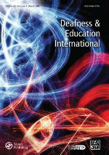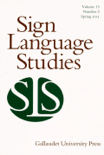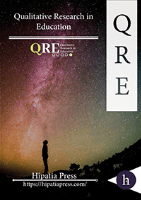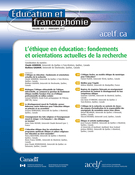
Deafness & Education International
Scope & Guideline
Advancing understanding in deaf education.
Introduction
Aims and Scopes
- Inclusive Education Practices:
The journal explores methodologies and frameworks that foster inclusive education, emphasizing the importance of integrating deaf and hard-of-hearing students into mainstream educational settings. - Language Acquisition and Development:
Research often focuses on the acquisition of sign languages and spoken languages among deaf children, examining how these processes affect learning and communication. - Cultural Perspectives and Identity:
The journal addresses the cultural identity of deaf individuals, exploring how cultural factors influence educational experiences and social interactions. - Family and Community Involvement:
There is a significant focus on the role of families and communities in supporting deaf education, highlighting collaborative approaches between educators and parents. - Technology in Deaf Education:
The journal investigates the use of technology to support learning outcomes for deaf and hard-of-hearing students, including assistive devices and educational software. - Policy and Advocacy:
Research includes discussions on policies affecting deaf education, advocating for rights and resources for deaf students and their families.
Trending and Emerging
- Intersectionality in Deaf Education:
There is an increasing focus on how various social factors, such as migration status and disability, intersect to affect the educational experiences of deaf individuals, highlighting the need for tailored educational interventions. - Family-Centered Early Intervention:
Research is trending towards family-centered models of early intervention, emphasizing the importance of involving families in the educational journey of deaf children from an early age. - Technological Integration:
The use of technology, including Artificial Intelligence and online platforms, is becoming a significant theme, exploring how these tools can enhance learning and accessibility for deaf students. - Cultural and Linguistic Justice:
Emerging discussions around linguistic justice and the rights of deaf individuals to access their preferred modes of communication are gaining prominence, advocating for equitable language policies. - Research on Pragmatics and Social Skills:
There is a growing interest in understanding and developing pragmatic skills and social communication strategies among deaf children, reflecting a shift towards holistic educational approaches.
Declining or Waning
- Traditional Communication Methods:
There has been a noticeable decline in research focused on traditional communication methods such as oralism and total communication, as the field increasingly embraces sign language and bilingual approaches. - Historical Perspectives on Deaf Education:
Research that primarily examines historical perspectives on deaf education is less prevalent, indicating a shift towards contemporary practices and current challenges faced by deaf individuals. - Strictly Medical Models of Deafness:
There is a decreased emphasis on medical models that view deafness solely as a disability to be treated, with a growing focus on social models that emphasize inclusion and accessibility. - Single-Domain Research:
Studies that concentrate on isolated aspects of deaf education without considering broader social, cultural, or technological contexts are becoming less common, as interdisciplinary approaches gain traction. - General Auditory Development Research:
Research focused solely on auditory development without considering the unique needs of deaf and hard-of-hearing individuals is declining, as the necessity for tailored approaches becomes clearer.
Similar Journals

INTERNATIONAL JOURNAL OF EARLY CHILDHOOD
Connecting research and practice for the youngest learners.INTERNATIONAL JOURNAL OF EARLY CHILDHOOD, published by Springer, is a prestigious platform dedicated to the exploration and advancement of knowledge in the fields of Developmental and Educational Psychology as well as Education. With an ISSN of 0020-7187 and E-ISSN 1878-4658, this journal plays a pivotal role in disseminating research findings and theoretical developments related to early childhood education worldwide. Its impact is underscored by its noteworthy rankings, placing it in the Q2 category for Developmental and Educational Psychology and Q1 in Education in 2023, reflecting its significance in the scholarly community. With a robust Scopus rank of #186 out of 1543 in Social Sciences Education and #68 of 360 in Developmental and Educational Psychology, this journal ensures high visibility and engagement for innovative research. Since its inception in 1969, the journal has served as a vital resource for researchers, educators, and policy-makers interested in shaping the future of education through empirical evidence and comprehensive studies.

Revista Iberoamericana de Educacion
Connecting Theory and Practice in Education Across BordersRevista Iberoamericana de Educacion is a premier academic journal dedicated to the field of education within the Ibero-American context. Published by the Organización Estados Iberoamericanos Educación Ciencia & Cultura (OEI), this Open Access journal has been providing valuable insights and research findings since 1993. With an ISSN of 1022-6508 and E-ISSN of 1681-5653, it serves as a vital resource for educators, researchers, and policymakers striving to enhance educational practices and address contemporary challenges in the region. The journal features a diverse range of articles that explore educational theories, policies, and methodologies, contributing significantly to the discourse on educational reform and innovation. Its commitment to accessibility and dissemination of knowledge makes it an essential tool for those looking to stay abreast of the latest developments in education. Located at Bravo Murillo 38, Madrid 28015, Spain, the Revista Iberoamericana de Educacion continues to foster collaboration and knowledge-sharing across Ibero-America, solidifying its role as a cornerstone in educational research.

Sign Language Studies
Exploring the nuances of sign language research.Sign Language Studies is a prestigious peer-reviewed journal dedicated to advancing the field of sign language research and the linguistic studies surrounding it. Published by Gallaudet University Press, this journal stands out in the realms of Linguistics and Language, being classified within the Q2 category as of 2023, which underscores its influence and relevance within academic circles. Operating under the ISSN 0302-1475 and E-ISSN 1533-6263, the journal has a remarkable Scopus ranking that positions it in the top 20% within the disciplines of Arts and Humanities and Social Sciences, attesting to the high quality and impact of its publications. Spanning a comprehensive timeline from 2002 to 2024, Sign Language Studies invites researchers, professionals, and students to engage with cutting-edge research, theoretical frameworks, and practical studies that contribute to our understanding of sign languages, their structure, use, and the communities they serve. This makes it an essential resource for those committed to the exploration and appreciation of sign language within both linguistic and social contexts.

Estudios Sobre Educacion
Advancing educational discourse through innovative research.Estudios Sobre Educacion is a leading open-access journal published by UNIV NAVARRA, SERVICIO PUBLICACIONES since 2001, dedicated to advancing the field of education through critical research and innovative thought. With an ISSN of 1578-7001 and an E-ISSN of 2386-6292, this journal serves as a vital platform for scholars from diverse educational backgrounds, facilitating the dissemination of knowledge and contemporary educational practices. As reflected in its standing as Q3 in Education (2023) and a respectable Rank #601/1543 in the Social Sciences - Education category according to Scopus, Estudios Sobre Educacion plays an instrumental role in shaping educational discourse on both national and international levels. Operating from Pamplona, Spain, this journal encourages researchers and educators to submit their research from 2008 to 2024, fostering an environment of collaboration and professional development. With its commitment to open access, the journal ensures that high-quality research is readily available to all, promoting the continuous advancement of education worldwide.

Etic net-Revista Cientifica Electronica de Educacion y Comunicacion en la Sociedad del Conocimiento
Exploring New Frontiers in Digital Learning and CommunicationEtic net-Revista Cientifica Electronica de Educacion y Comunicacion en la Sociedad del Conocimiento, published by UNIV GRANADA, is a pioneering open-access journal dedicated to the exploration and dissemination of research in the fields of education and communication within the context of knowledge society. Since its inception in 2002, this journal has provided a platform for scholars, researchers, and practitioners to share innovative ideas and empirical studies, fostering critical dialogue and collaboration in the rapidly evolving landscape of digital education and communication. With its ISSN 1695-324X, Etic net aims to bridge theoretical frameworks and practical applications, contributing significantly to the scholarly discourse and practices that shape contemporary educational experiences globally. Through its commitment to open access, the journal ensures that high-quality research is freely available to all, promoting inclusivity and accessibility in academic publishing. We invite you to explore the latest findings and contribute to shaping the future of education and communication by engaging with this essential resource.

Qualitative Research in Education
Fostering critical dialogues in education and the arts.Qualitative Research in Education is an influential open-access journal published by HIPATIA PRESS, based in Barcelona, Spain. With an ISSN of 2014-6418, this journal has been dedicated to advancing the field of qualitative methodologies within the realms of education, developmental psychology, and the arts and humanities since its inception in 2012. Highlighted by a commendable Q2 ranking in both Arts and Humanities and Education, as well as a Q3 position in Developmental and Educational Psychology as of 2023, it offers critical insights and innovative research that resonate with educators, researchers, and policymakers. The journal is indexed in prominent databases and boasts a solid reputation, ranking in the 79th percentile for Arts and Humanities and 70th percentile for Education in Scopus, affirming its contribution to scholarly discourse. As it converges towards the years 2018 to 2024, Qualitative Research in Education remains a vital resource for those seeking to enhance their understanding of qualitative approaches in educational settings.

Education et Francophonie
Connecting Scholars to Transform French EducationEducation et Francophonie is a distinguished academic journal published by the Association Canadienne d'Éducation en Langue Française (ACELF), dedicated to the exploration and advancement of research in the field of French language education. With its ISSN 0849-1089 and E-ISSN 1916-8659, this journal serves as a vital platform for scholars, educators, and practitioners to disseminate their findings and engage in meaningful dialogue about the educational challenges and innovations within Francophone contexts. Although currently lacking in open access options, the journal's rigorous peer-review process ensures the publication of high-quality, impactful research that rigorously addresses the needs and dynamics of French language education in Canada and beyond. As a key resource for researchers and professionals, Education et Francophonie fosters a deeper understanding of pedagogical strategies, policy development, and cultural integration in language education, making it indispensable for anyone invested in the francophonie and education sectors.

Australian Journal of Teacher Education
Connecting research and practice for transformative education.Welcome to the Australian Journal of Teacher Education, a leading scholarly publication dedicated to advancing the field of education through innovative research and impactful discourse. Published by Edith Cowan University, this journal serves as a vital platform for educators, researchers, and practitioners to share their findings and insights in the sphere of teacher education. With a commendable Q2 ranking in Education and recognition within the 45th percentile of Scopus's education category, the journal underscores its commitment to maintaining rigorous academic standards while embracing the burgeoning landscape of teacher training and curriculum innovation. Since its inception in 2008, the journal has provided an open access format to its readers, facilitating unrestricted dissemination of knowledge across Australia and beyond. Set against the backdrop of Australia's vibrant educational research community, the Australian Journal of Teacher Education is pivotal for those seeking to engage with current trends and methodologies in teaching and learning.

Journal of Education
Exploring the frontiers of education and development.The Journal of Education, published by the University of Kwazulu-Natal’s School of Education & Development, is a vital academic resource dedicated to advancing knowledge within the education sector. With its ISSN 0259-479X and E-ISSN 2520-9868, this Open Access journal has been committed to accessibility and dissemination of research since 2017, making significant contributions to the field from its base in South Africa. Though it currently holds a Q4 ranking in the 2023 Education category, the journal serves as an essential platform for scholars and practitioners aiming to share innovative teaching methodologies, educational research, and policy studies. Researchers will appreciate its growing relevance as it converges studies from 2019 to 2024, ensuring it remains at the forefront of educational discourse. By addressing crucial issues in social sciences and education, the Journal of Education is poised to support the development of a more informed and effective educational landscape.

International Education Journal-Comparative Perspectives
Fostering Dialogue on Global Educational Challenges.International Education Journal-Comparative Perspectives is a vital platform for the dissemination of research in the field of comparative and international education. Published by the Oceania Comparative & International Education Society in Australia, this journal has been contributing to academic discussions and scholarship since its inception in 1999. With ISSN 1443-1475 and E-ISSN 2202-493X, this journal covers a broad spectrum of topics relevant to education practitioners, researchers, and policymakers. Notably positioned in the Q4 quartile within its category and ranking 1247 out of 1543 in Scopus, it serves to highlight diverse educational practices across different contexts. Although it does not currently feature an open access model, the journal aims to promote knowledge exchange and enhance comparative educational research through its dedicated publications. As it continues to expand its reach until 2024, the International Education Journal-Comparative Perspectives remains an essential resource for those committed to understanding and improving education globally.